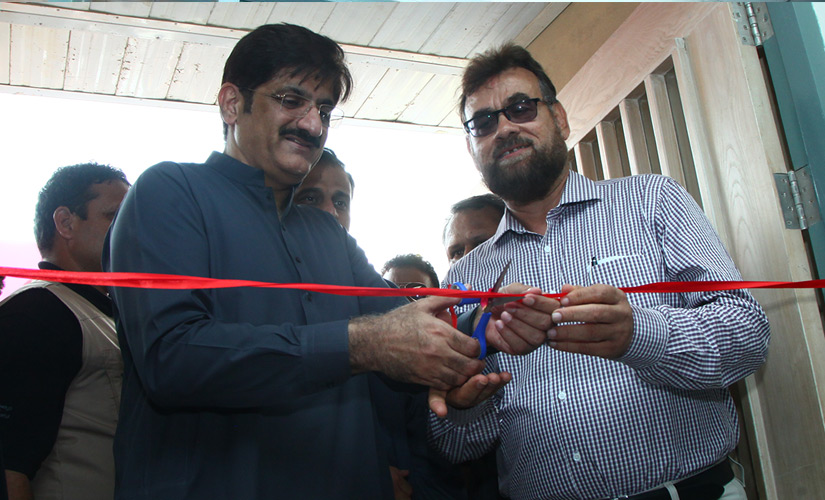SYED MURAD ALI SHAH, CHIEF MINISTER OF SINDH INAUGURATES INDUS HOSPITAL’S PEDIATRIC COMPLEX AND APPRECIATES ITS EFFORTS TO REDUCE CHILDREN’S SUFFERING
“The Indus Hospital has a special place in my heart for its valuable contribution to the healthcare system of Pakistan”, said Syed Murad Ali Shah, Chief Minister of Sindh. He was visiting the Indus Hospital (TIH) on Friday, May 10, 2019 to inaugurate the Pediatric Complex. Dr Abdul Bari khan, Chief Executive Officer, Indus Health Network (IHN) welcomed him. IHN’s Board Members, Executive Directors, and faculty members were also present.
Mr. Shah visited the hospital and inaugurated the Pediatric Complex. TIH is a 300-bedded hospital out of which 115 beds are dedicated for pediatric services which include 85 beds for pediatric oncology patients. As of June 2018, about 9,000 children have been treated for cancer and blood diseases.
Government of Sindh has a long association with the Indus Hospital. Mr. Shah played an instrumental role in Indus’ development. During his tenure as the Minister for Finance, Sindh the Indus Hospital received grant from the Government of Sindh. Under the Public-Private Partnership program, Government of Sindh is working with IHN and District Headquarter Hospital, Badin and Regional Blood Center, Jamshoro are some of the fine examples of this partnership. Recently, IHN’s Global Health Directorate inaugurated a container clinic near Badin to serve people at their doorstep.
During his speech Mr. Shah said, “Fortunately I’ve been a part of this noble cause since long. I’m happy to see Indus Hospital evolving into a country-wide healthcare network. I’m delighted to see the state-of-the-art pediatric complex which along with other diseases treats childhood cancer as well. It’s one of the leading pediatric oncology center of the country. I take this opportunity to salute the team for their hard work. I hereby pledge that I’ll support their vision in my personal and official capacity and I urge others to do the same.”
In his address, Dr Abdul Bari said, “I’m, on behalf of the Board of IHN welcome the honorable CM. We value his personal commitment with the Indus Hospital. He took special interest in the cooperation between government of Sindh and IHN. Indus Hospital is expanding both its services and infrastructure to cater to the ever-increasing number of patients. I’m sure, Government of Sindh will continue to support the cause and facilitate us in reaching out to more areas of interior Sindh. We, at Indus, are trying to help the government in improving the health indicators of the province and I’m sure that the CM would acknowledge our efforts and help us with funding and other support.”
In his speech, Dr M. Shamvil Ashraf, Executive Director, Medical Services, highlighted the services provided to children at Indus Hospital particularly for childhood cancer. He informed that this is one of the largest pediatric cancer treatment units in Pakistan. Since, Sindh has no childhood care facility other than Indus, therefore, it faces immense pressure in coping up with the influx of patients. He requested the CM to support the cause of childhood cancer and invest in establishing more cancer treatment units in Sindh.”
About The Indus Health Network (IHN)
In the year 2007, The Indus Hospital (TIH) started as a 150 bed, state-of-the-art, tertiary healthcare facility providing quality treatment free-of-cost to every patient. After widening its scope of work, TIH has turned into the Indus Health Network (IHN). The network is focusing on the development and management of various public and private hospitals throughout Pakistan. The network is also carrying out Malaria, AIDS and TB outreach programmes in the country.




